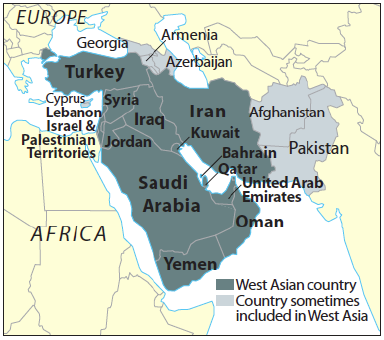 Walid al-Muallem, Syria’s deputy prime minister and foreign minister (L) receives the credentials of Oman’s Ambassador Turki bin Mahmood al-Busaidy, Damascus, October 5, 2020
Walid al-Muallem, Syria’s deputy prime minister and foreign minister (L) receives the credentials of Oman’s Ambassador Turki bin Mahmood al-Busaidy, Damascus, October 5, 2020
The presentation of the Letter of Credence in Damascus on October 5 by the newly appointed envoy of Oman marks a defining moment in the Syrian conflict. The regional states recognise that the legitimacy of the Syrian government headed by President Bashar Al-Assad is not in doubt. The UAE already reopened its embassy in Damascus headed by chargé d’affaires.
Oman took the momentous step just 5 days after the fifth anniversary of the Russian intervention in Syria, which turned the tide of the war in favour of Assad — who nonetheless insists, justifiably so, that Russia’s major naval and air bases in his country will continue to help counter the influence of Western powers in the region.
Oman’s example may be a trend-setter. Egypt may follow suit — maybe, Jordan and Kuwait, too. The Saudis may drag their feet, given the embarrassment that their intervention in Syria ended in dismal failure. Qatar? Not unlikely, despite its alliance with Turkey.
However, the crux of the matter is that Oman, a Gulf state which closely synchronises its diplomacy with UK and the US. Oman played a key role as ‘facilitator’ in the US-Iran standoff. Will it perform a similar role to facilitate contacts between Washington and Damascus? Arguably, this could be the leitmotif of the Omani move. Muscat almost certainly consulted Washington and London.
In every sense, therefore, diplomacy is shifting gear apropos the Syrian conflict. In Iraq, US has lately adopted an approach to use coercive diplomacy — ‘smart power’ — to good effect so much so that it is able to leverage its influence in Baghdad to loosen Iran’s grip over its immediate neighbour.
Israel which is helping the US militarily, as the recent air attacks on pro-Iranian militia groups suggest, will be hoping for a similar approach with regard to Syria as well. For Israel, continued US presence in Syria is an imperative need. And, of course, the US military presence in Syria is unsustainable without a presence in Iraq as well.
Meanwhile, Israel’s agenda toward Syria is transforming, too. A need arises now to switch back to dealings with Assad who used to be a cooperative interlocutor previously. If a conversation begins between Washington and Damascus, trust Israel to tap into it.
Second, Israel’s normalisation with the Gulf states already gives it some strategic depth in the Arab world. In Syria, Israeli and Emirati interests vis-a-vis Iran converge.

Third, most important, Israel is preparing for a confrontation with Turkey’s president Recep Erdogan. What form it takes, time only can tell. Most probably, a war of attrition has begun. The Israeli game plan will be to weaken Erdogan by the time the next parliamentary election is due in Turkey in 2023 or when his own re-election is due in another three years.
To be sure, Israel’s appearance in Caucasus and the Black Sea (Ukraine, Georgia and Azerbaijan) shows itself as a concerted attempt to outflank Erdogan. In this enterprise, Israel can count on the US and France, Egypt, Saudi Arabia and the UAE. (But, contrary to the misperception that Israel would want to propagate, its ties with Russia are somewhat under the weather lately.)
On the other hand, Turkey-Qatar alliance is also enjoying some convergence with Iran. (The Nagorno-Karabakh conflict may create some distance between Ankara and Tehran for the time being, but both sides are keen to avoid any serious misunderstanding.) Turkey and Iran have specific interests in the Syrian and Iraqi situation, but on the “Syraq” turf (Syria+Iraq) the US-Israeli-Gulf Arab axis poses a common challenge to Ankara and Tehran.
The big picture is that Syria’s progress toward greater normalcy and stabilisation will depend critically on international assistance forthcoming for its reconstruction. The UAE is a potential donor. So is China. Iran and Russia would have limitations. And Turkey’s role is problematic so long as its occupation of Syrian territory continues.
But if a settlement can be worked out at Geneva, western aid embargo and sanctions will get lifted. Thus, the US aim will be to nudge Assad regime toward making compromises to reach a settlement. Russia would go along with such a trend. In principle, the stabilisation of Syria is in Russian interests.
However, Moscow will be wary of the creeping US-Israeli axis. The western attempts to roll back the Russian military presence in the Mediterranean surely engage Moscow’s attention. Besides, the NATO is consolidating a presence in the Back Sea to challenge Russian dominance.
Clearly, the Russia bases in Syria are crucial strategic assets for Moscow and they would come into western crosshairs at some point. Suffice to say, Russia will do its utmost to ensure that a friendly government is in power in Damascus.
Second, given the importance attached to the entente with Turkey in the Russian strategic calculus, Moscow’s best bet still would be to persuade Erdogan to get back into the fold of the Adana Accords (1998) with Syria and turn a new page in Turkish-Syrian ties.
Russia has a historical memory of the synergy that exists between the Caucasus and the Middle East. A Russian-Turkish confrontation over Caucasus can be virtually ruled out in these circumstances.
